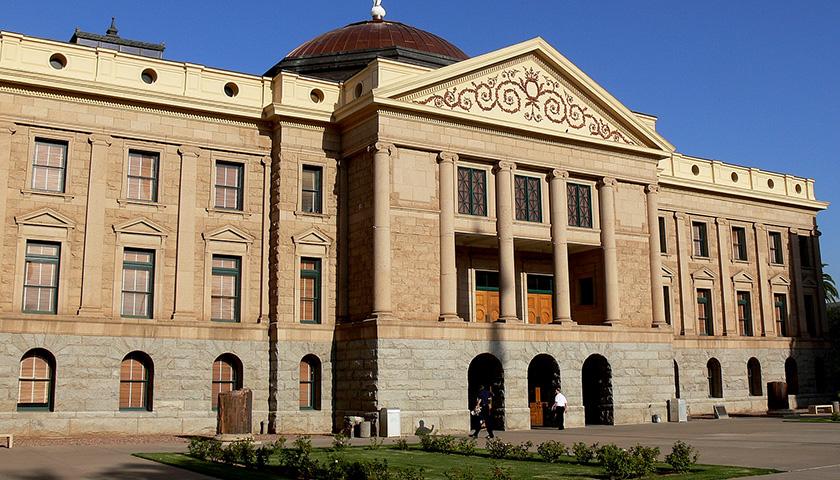The Arizona House Republicans issued a “2025 Majority Plan” this week, laying out their plans for this year’s legislative session. The conservative blueprint contains sections on securing elections, securing the border, protecting individual rights and liberties, economic prosperity, improving education, and streamlining government.
Under the direction of new House Speaker Steve Montenegro (R-Glendale) (pictured above), the plan to secure elections states, “Arizona voters deserve elections that are free, fair, and transparent. It shouldn’t take weeks to count ballots. We will protect the integrity of Arizona elections from anyone who chooses to tamper with them, and we will ensure that ballots are counted faster and results are known sooner.”
State Representative Alex Kolodin, an election attorney who was disciplined by the State Bar of Arizona for filing election lawsuits challenging the botched 2020 election, is heading up a new House Ad Hoc Committee on Election Integrity and Florida-Style Voting Systems. He is sponsoring a bill to speed up the ballot tabulation of Arizona’s elections, modeled after Florida law. Florida announces election results overnight after an election, whereas Arizona has come under criticism for taking up to two weeks due to lengthy signature verification on mail-in ballot affidavits.
HCR 2013 will “improve the accuracy, security, and efficiency of Arizona’s electoral process through measures such as enhanced address verification, early ballot ID numbers to replace signature verification, the elimination of late early ballots, and a prohibition on foreign funding in elections” Kolodin said in a press release. The Arizona Senate Judiciary and Elections Committee passed a similar bill styled after Florida law, SB 1011, with a 4-3 vote along party lines on Wednesday.
Former Maricopa County Recorder Stephen Richer, who was ousted from office last year by voters due to his hostility to election integrity, published an article Thursday praising Kolodin’s bill. He noted that while 293,000 voters in Maricopa County dropped their early ballots off at the last minute on Election Day, only 5,000 Florida voters dropped their early ballots off in Miami-Dade County on Election Day.
Richer was skeptical of arguments that the change would disenfranchise voters. “Others say that doing away with en masse ‘late earlies’ will disenfranchise voters who have been using this method for many years,” he said. “But there’s no evidence to support that claim. … Of course, we like being able to procrastinate. But do we really value procrastination more than knowing winners and losers on Election Day?”
The House Republican majority plan to secure the border includes six prongs. First, supporting Arizona’s newly passed Proposition 314. The measure, which passed with over 62 percent support from voters, makes it a state crime to enter the country illegally, allows local and state law enforcement to arrest illegal border crossers, requires the use of the e-Verify program to determine immigration status before someone enrolls in public assistance or financial aid, and makes the sale of fentanyl a Class 2 felony if the person knowingly sells fentanyl and it results in the death of another person.
The plan, which is similar to the one proposed by the Arizona Senate Republican majority, supports a property tax refund if government fails to enforce public nuisance laws including those against camping. It seeks to strengthen laws against sanctuary cities, coordinate local law enforcement with federal law enforcement to stop trafficking and fentanyl, invest in law enforcement training and retention, and audit state agencies that contract for refugee services for compliance with state and federal laws.
For streamlining government, the plan says it will defend parental rights, protect medical freedoms, protect the right to work, “[r]equire able-bodied welfare recipients to work, train, or volunteer in order to receive benefits,” “[a]djust unemployment benefits based on the job market,” and reform licensing and regulations in order to spur innovation.
That section also states legislators will remove DEI mandates from government, “[r]equire a 60% supermajority of any government body to pass a tax increase,” eliminate fraud and abuse in government programs, “curb excessive spending,” cut redundant positions, and “[r]equire public universities to disclose foreign investments and ban harmful partnerships with adversaries.”
A lengthy section on education provides nine goals. They are removing woke policies from classrooms and DEI from public higher ed, “[e]nhanc[iung] transparency in foreign investments in Arizona’s higher education system,” protecting free speech on college campuses, promoting school choice and defending Empowerment Scholarship Accounts, “[i]ncreas[ing] teacher pay by prioritizing classroom funding over bureaucracy,” and [e]nsur[ing] transparency in school board elections, finances, and resource management.”
The section addressing economic prosperity includes protecting private property rights, “[p]rioritiz[ing] Arizonans in land ownership over foreign adversaries,” eliminating taxes on tips for tipped employees, expediting land development and permit reviews to make housing affordable, and securing Arizona’s water resources.
The portion on protecting individual rights and liberties focuses on transitioning people off of government assistance. “Under our leadership we will focus Arizona’s welfare and unemployment programs on empowering people to enter the workforce and start a new chapter of opportunity in their life,” it states.
Read the Arizona Senate majority’s plan for 2025 here.
– – –
Rachel Alexander is a reporter at The Arizona Sun Times and The Star News Network. Follow Rachel on Twitter / X. Email tips to [email protected].
Photo “House Speaker Steve Montegro” by Steve Montenegro and “Arizona Capitol” by Wars CC3.0.





